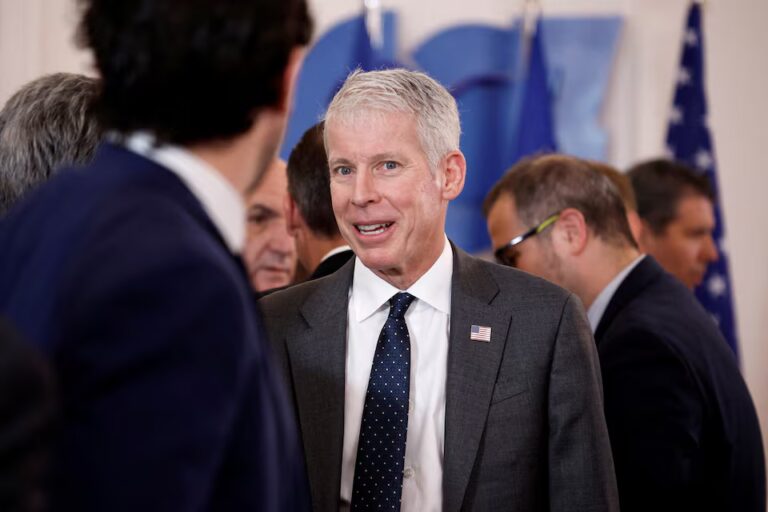US Energy Secretary Says Biggest Use Of Loan Office Will Be For Nuclear Power Plants
Ukraine Suffers Power Cuts After Russia’s Heaviest Air Barrage In Months
Ghana: ECG Launches Nationwide Revenue Drive Dubbed ‘Operation All Must Pay’
Chevron Secures Two Offshore Oil Blocks In Guinea-Bissau
Ghana: NPA To Hold Consumer Week In Ashaiman Tomorrow

Togo: Energy Ministry Launches US$10.5 Million Power Grid Upgrade To Improve Reliability
Nigeria: Dangote Refinery Cuts Petrol Price To ₦828/Litre, Offering Relief To Nigerians
Zambia: Energy Minister Breaks Ground For 200MW Solar Project In Mumbwa
 ZESCO Acting Managing Director Eng. Wesley Lwiindi said the 236-hectare project will bolster grid stability and reduce overreliance on hydropower, while fostering skills development and economic growth in the local community.
“ZESCO is not only a power utility; we are a strategic partner in national development. This project demonstrates the strength of collaboration between the private sector and public institutions,” Lwiindi said.
Central Province Minister Mwabashike Nkulukusa assured stakeholders that the investment is secure and will deliver long-term benefits, citing visible results from ongoing policy reforms.
He encouraged more investors to explore opportunities in the province and urged communities to safeguard the facility for future generations.
Mumbwa Member of Parliament and Southern Province Minister Credo Nanjuwa described the project as a milestone for both the district and the nation.
He thanked traditional leaders for supporting development and commended the President for fostering an investment-friendly climate that promotes job creation and community upliftment.
ZESCO Acting Managing Director Eng. Wesley Lwiindi said the 236-hectare project will bolster grid stability and reduce overreliance on hydropower, while fostering skills development and economic growth in the local community.
“ZESCO is not only a power utility; we are a strategic partner in national development. This project demonstrates the strength of collaboration between the private sector and public institutions,” Lwiindi said.
Central Province Minister Mwabashike Nkulukusa assured stakeholders that the investment is secure and will deliver long-term benefits, citing visible results from ongoing policy reforms.
He encouraged more investors to explore opportunities in the province and urged communities to safeguard the facility for future generations.
Mumbwa Member of Parliament and Southern Province Minister Credo Nanjuwa described the project as a milestone for both the district and the nation.
He thanked traditional leaders for supporting development and commended the President for fostering an investment-friendly climate that promotes job creation and community upliftment.
Fossil Fuel Age Is Ending, Says UN Chief
Ukraine Drone Strikes Throw Power Supplies Into Disarray In Russian Cities
France: EDF, Mammoet Sign Nuclear Construction Deal
Congo: APPO Names Algeria’s Farid Ghezali As New Secretary General
Nigeria: AEDC Sacks 800 Non-Performing Employees
Renewable Energy Boom Drives Up India’s Power Transmission Costs
India’s renewable energy boom is leading to soaring transmission costs as the country’s transmission network is being built on estimates of potential renewable power generation not on actual capacity or demand, according to a top electricity market executive.
This approach to transmission leads to surging transmission charges that state power utilities have to pay, Ghanshyam Prasad, chair at the Central Electricity Authority (CEA), said at an energy event on Friday. The authority will now look to revise transmission plans every six months to take stock of real-time capacity and demand, Prasad said, as carried by Reuters. India is struggling to accommodate the massive renewable energy buildout which could lead to developers installing renewable energy generation capacity that cannot be transmitted or sold, the official added. The country will also need to continue investing in other electricity sources, including coal, hydropower, gas, and nuclear, to keep the grid reliable, Prasad said. “Until we see the system holistically — planning, execution, grid operation, and cost — we will go wrong,” he noted. In July, India boasted achieving five years ahead of schedule its target to have 50% of its installed electricity capacity coming from non-fossil fuel sources. Despite booming renewable capacity additions, India continues to rely on coal to meet most of its power demand as authorities also look to avoid blackouts in cases of severe heat waves. Coal-fired power generation and capacity installations in India continue to rise, and coal remains a key pillar of India’s electricity mix, with about 60% share of total power output. This jump in installed renewable capacity does not mean renewable power generation will soon replace coal in India, especially if grid constraints and battery and transmission delays persist. India’s federal government is in discussions with state governments to have them buy more renewable sources for power generation, Indian federal Minister of New and Renewable Energy, Pralhad Joshi, said in September.














